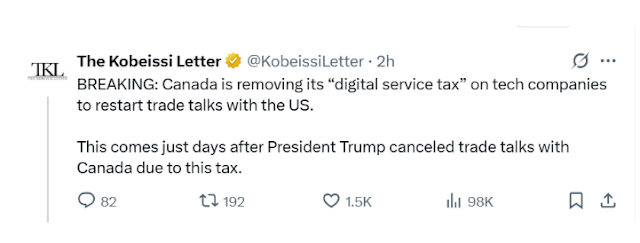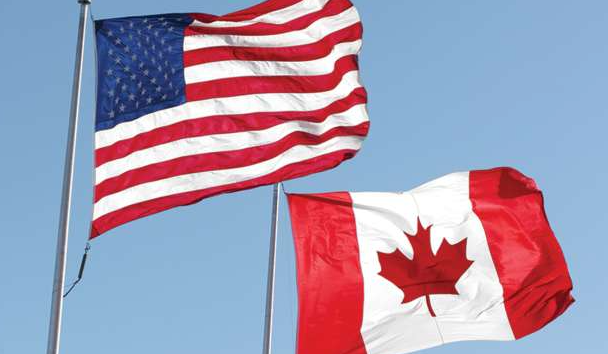Canada withdraws the digital services tax to relive commercial conversations with the United States
In a significant policy reversion, Canada has decided to cancel its 3% Digital Services (DST) tax in the main international technology companies, a measure aimed at restarting trade negotiations stagnant with the United States. The decision, announced just before the tax was promulgated, highlights the influence of the recent political pressure of President Donald Trump and underlines the complex relationship between digital taxes and global commercial diplomacy.
The DST initially proposed in 2020 as part of Canada’s efforts to close the fiscal gap created by global technological giants that obtain substantial income in Canada without paying proportional taxes. The tax would have been applied retroactively as of January 2022 and it was projected that it would generate more than 7 billion in government revenues in the next five years. However, it quickly became a point of inflammation in diplomatic relations between Ottawa and Washington.
 |
| Source: x |
The administration of President Trump responded to the imminent DST with a strong opposition, describing him as a direct attack on US companies. At the end of June, the United States abruptly suspended all commercial negotiations with Canada, citing the DST as a violation of the principles of fair trade. In a matter of days, Canadian leaders yielded to pressure. Prime Minister Mark Carney and Finance Minister François – Philippe Champagne jointly announced that Canada would archive the DST and introduce the legislation for their formal repeal.
The moment of the investment was remarkable. Since G7 leaders gathered recently in Kananaskis, Alberta, both countries are under pressure to end a new Bilateral Security Agreement before July 21. Canadian officials declared that eliminating the DST was a “necessary measure of confidence construction” to create a more cooperative environment for productive commercial negotiations.
“To terminate the DST will allow the negotiations of a new economic and security relationship with the United States to make vital progress and reinforce our work to create jobs and develop prosperity for all Canadians,” said Minister of Finance Champagne. Prime Minister Carney echoed the feeling, stating that the decision “will support a resumption of negotiations towards the July 21 timeline.”
 |
| Source: x |
While the measure was applauded by American officials and multinational technology companies, caused mixed reactions nationwide. Many Canadian citizens and defense groups had seen the DST as a tool to hold technological giants and ensure that they contribute to the local economy. The critics of the repeal argue that Canada has weakened its position under foreign pressure and may have sacrificed the autonomy of long -term policy for short -term commercial relief.
Canada is not alone in the exploration of digital taxes. France, the United Kingdom and several countries of the European Union have adopted or proposed similar taxes, seeking a more just income distribution in a global digital economy. However, the decision of the Canadian government to reverse the course under the pressure of the United States can establish a precedent that encourages other nations to reconsider their approaches against possible economic consequences.
In the heart of the subject there is a global struggle to modernize tax frameworks in an increasingly digital economy. Traditional fiscal models do not have adequate to capture the value generated by digital platforms that operate through borders without physical presence. This has led to a national DST mosaic, while multilateral conversations led by the Organization for Economic Cooperation and Development (OECD) have sought an international coordinated approach.
Canada has constantly expressed its support for a solution led by the OECD. In fact, the original design of the DST included a clause that would be withdrawn if a global agreement was reached. However, with such conversations moving slowly and the technological income that rises rapidly, the government was initially forced to act unilaterally. The current reversal indicates a renewed commitment to diplomacy and international cooperation on solo action.
As part of the agreement to resume trade negotiations, Canadian officials have promised to work in close collaboration with American counterparts to address digital taxes within a broader bilateral framework. Analysts say that conversations could include joint efforts to accelerate the results of the OECD or potentially create a digital fiscal policy model of North America.
Beyond the fiscal issue, the deadline of July 21 for a new commercial agreement appears. Both countries are eager to update and expand the commercial relationship of the United States in Canada in the context of the evolution of global challenges, from the resilience of the supply chain and digital safety to climate objectives and artificial intelligence governance.
 |
| Source: x |
For the United States, DST repeal represents a diplomatic victory and reaffirms its influence on commercial partners in the digital policy sphere. For Canada, it is a calculated withdrawal, designed to preserve commercial stability and unlock future economic opportunities, but not without cost.
It remains to be seen if this movement results in tangible gains. The effectiveness of the government’s decision will probably depend on the result of July’s commercial conversations. If Canada can ensure significant commitments of the US, as promises of technological investment or support for a multilateral tax agreement, compensation may be valuable.
Meanwhile, repeal has added a new urgency to international discussions on the regulation of the digital economy. As more governments try to balance innovation with fair taxes, Canada’s experience serves as a warning story about the limits of national action in a technological panorama interconnected worldwide.
Ultimately, this episode illustrates how modern politics is increasingly formed by the intersection of taxes, geopolitics and technological change. The digital services tax may disappear for now, but the broader question of how to ensure that digital giants pay their fair part are still very alive.
Writer
@Ellena
Ellena is an experienced cryptographic writer who loves to explore the intersection of blockchain technology and financial markets. She regularly provides information about the latest trends and innovations in the currency space.
See other news and articles on Google News
Discharge of responsibility:
The articles published in Hokanews are intended to provide updated information on various topics, including cryptocurrency and technology news. The content on our site is not intended to be an invitation to buy, sell or invest in any asset. We encourage readers to conduct their own research and evaluation before making an investment or financial decision.
Hokanews is not responsible for any loss or damage that may arise from the use of the information provided on this site. Investment decisions must be based on an exhaustive investigation and advice of qualified financial advisors. Information about Hokanews can change without prior notice, and we do not guarantee the precision or integrity of the published content.


